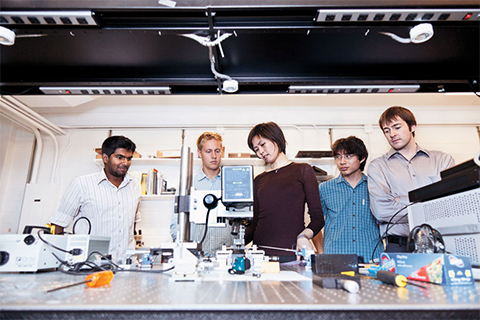Just this summer, a U of T team including electrical engineers, engineering physicists and chemists used organic chemistry techniques to build a new kind of solar cell that’s almost 40 per cent more efficient than existing ones. The multidisciplinary makeup of the team was key to their breakthrough, but this kind of creative problem solving isn’t just serendipity. It can be nurtured – and the Faculty of Applied Science and Engineering has big plans to do just that. Fundraising has begun to build a new Centre for Engineering Innovation and Entrepreneurship on St. George Street, next to the existing engineering complex.
The high-tech facility will stimulate innovative and entrepreneurial thinking by creating a common space for engineers from different disciplines. Students and professors working on everything from pollution- absorbing concrete to cars that talk to you and to the traffic around them will rub elbows daily, sharing their different insights and approaches to problems. Students won’t just get a more rounded education or enjoy an exciting creative atmosphere – they’ll graduate well-prepared for a career that increasingly demands an entrepreneurial outlook. “Proximity matters,” says David Sinton, director of the faculty’s Centre for Sustainable Energy. “I hope the multidisciplinary spirit will permeate the building. Collecting faculty units focused on global innovation, design, energy and sustainability under one roof is an exciting and unique opportunity.”
Even the building itself will be designed to spark creative collaboration, with open-concept workspaces adjacent to a facility where students, professors and industry partners can quickly build and test prototypes; a “hatchery” space will be dedicated to nurturing student-led business startups. The proposed shared spaces are part of an intensive focus on cross-disciplinary teaching and research that is a core goal for U of T. “Through its multidisciplinary and collaborative intent and its exceptionally flexible design, the Centre for Engineering Innovation and Entrepreneurship embodies the future of the faculty,” says Dean Cristina Amon.
Fundraising for the $88-million project kicked off with $1-million donations from alumni Paul Cadario (BASc 1973) and Peter Allen (BASc 1962), plus a $5-million gift from George Myhal (BASc 1978), a senior partner at Brookfield Asset Management in Toronto and chair of the engineering wing of U of T’s Boundless campaign. “Cristina Amon’s leadership has helped to propel U of T Engineering onto the global stage,” says Myhal. “This is an investment in Dean Amon’s vision for Engineering, and the ability of its faculty and students to make a transformational impact in Canada and across the world.” The faculty hopes to break ground by mid-2014.
Recent Posts
People Worry That AI Will Replace Workers. But It Could Make Some More Productive
These scholars say artificial intelligence could help reduce income inequality
A Sentinel for Global Health
AI is promising a better – and faster – way to monitor the world for emerging medical threats
The Age of Deception
AI is generating a disinformation arms race. The window to stop it may be closing




